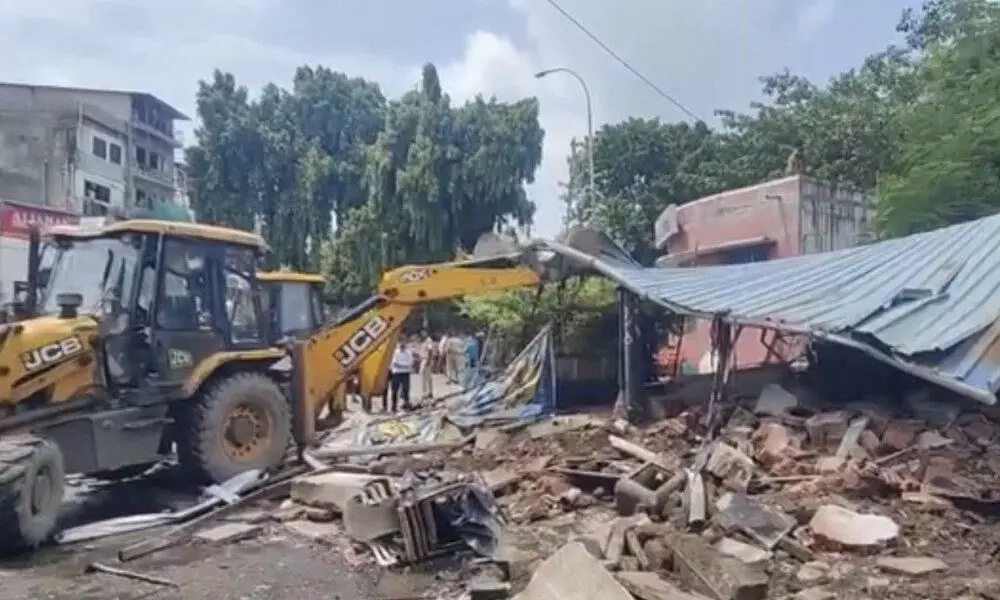
Stone pelting mystery: Surat police target Muslim youths as scapegoats
text_fieldsAmid the mystery of stone pelting at a Ganesh pandal in the Variavi Bazar in Gujarat’s Surat, the police apprehended and detained 33 Muslim males, including six minors, and a video later released on social media by the police showed the arrested men limping, indicating torture in custody and creating tension in the area on September 8.
The situation worsened when a crowd of 200 to 300 locals gathered near the Lal Gate police station in the neighbouring Saiyedpura area to protest the detention of the minors. The protest soon turned violent, as per the police, with the mob allegedly attacking police officers and causing significant damage to nearby vehicles, The Wire reported.
However, the police have yet to find who created a commotion at the Ganesh pandal by throwing stones, the residents claim that the police have arrested innocent youths, who were later subjected to brutal custodial torture, as though the authorities were found to be creating scapegoats for their political mileage.
The video posted on social media by the Surat City Police appeared to show the detainees struggling to walk after being taken into custody, raising concerns among locals about possible physical abuse while in police custody. The video, which began with an image of a Ganesha idol, depicted the men limping and barefoot, fuelling further anger in the community, The Wire reported.
Local residents voiced concerns that several individuals, including one man who had reportedly been out of Surat on the day of the stone pelting, were detained without proper cause, according to The Wire.
The detainees’ families expressed their belief that the police were attempting to scapegoat certain individuals to swiftly resolve the unrest. The incident highlighted the rising communal tensions in the region, with residents accusing the police of targeting the Muslim community.
Advocates representing some of the detainees argued that the incident had been exaggerated for political purposes. Meanwhile, activists called for accountability, arguing that the alleged abuse violated basic legal protections under the Code of Criminal Procedure. They called on authorities to identify and hold responsible those involved in the mistreatment of the detainees, emphasising the need for impartiality and fairness in the administration of justice.
Simultaneously, the issue of demolitions emerged in connection with the events. On September 9, local authorities carried out a demolition drive in the Saiyedpura area, targeting illegal structures and temporary roadside shops.
While the deputy mayor of Surat, Narendra Patil, claimed that the demolitions were part of a pre-planned effort to clear illegal encroachments, many residents believed the timing of the action was linked to the communal unrest that had taken place the previous day, as reported by The Wire. Among the structures demolished was a shack belonging to the relative of a leader from the BJP minority cell.
The demolitions followed closely on the heels of a strong observation from the Supreme Court regarding “bulldozer justice.” The court had cautioned against the use of demolitions as a form of retribution, stating that the illegal actions of one family member could not justify the destruction of their legally constructed homes. This observation came after a petition was filed by a resident of Gujarat, who expressed concern that his home might be demolished following the filing of an FIR against a family member.
In the aftermath of the Saiyedpura demolitions, local leaders and residents voiced their suspicions that the demolition drive was not merely a pre-planned effort to remove illegal structures but rather a targeted action linked to the previous day's violence. They argued that the area had housed makeshift settlements for decades, and the sudden decision to clear these structures immediately after a communal clash raised questions about the intent behind the move.
Following the unrest and demolitions, senior officials, including the police commissioner and Gujarat’s junior home minister, visited the area to assess the situation. The minister assured the public that those involved in disturbing the peace would face serious consequences.






















